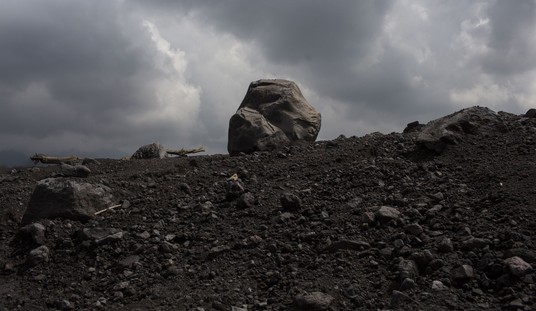If there is one overarching lesson to be found in yesterday’s Energy Information Administration report on the United States’ relatively newfound and positively dizzying energy abundance largely unlocked by the auspices of the private sector and recent drilling innovations, it’s that fossil fuels are not going anywhere for quite awhile — which makes it rather unfortunate for the radically progressive eco-contingent that they have worked so very hard to manufacture the Keystone XL pipeline as the major politicized issue on which to hang their climate-change hats. The oil-and-gas industry is awash in resources, and while the Keystone XL pipeline would have been the most cost-effective, energy-efficient, safest, cleanest way for Canadian and North Dakotan companies to transport those goods, it is still perfectly profitable for them to find other ways around the bottlenecks that the relative lack of available pipeline infrastructure is creating — namely, railroad.
The eco-lobby’s biggest argument throughout this entire painfully drawn-out episode has been that allowing the pipeline to proceed would exacerbate the onslaught of climate change by allowing Canada to more readily develop their oil sands; President Obama himself tried to reassure them on that score by directing the State Department not to issue their approval unless they determined the project would not cause a net increase in greenhouse gas emissions. As sane, rational people everywhere have been trying to impress upon these determinedly single-minded eco-radicals, however, the permanent absence of the Keystone XL pipeline will do exactly nothing to stop these companies from developing those resources. Where there’s a will, there’s a way, whether that means using more railroad or shipping their products by sea to the ever-eager buyers in China.
The entire fruitless exercise, however, has been an apt lesson in how not to pick your battles. Oil companies have been acting pragmatically as it’s become increasingly clear that the administration is deliberately slow-walking the endeavor, and Reuters reported yesterday that Continental Resources, one of the companies that has committed to shipping crude via the Keystone pipeline’s proposed northern extension, thinks that energy companies will be able to equip themselves to cope without it:
Continental has signed on to ship some 35,000 barrels of its own oil from the Bakken field of North Dakota on the 1,179-mile, $5.4-billion Keystone XL line. But construction of the pipeline has been delayed for years as TransCanada has sought regulatory approvals, and Continental has since turned to railroads to get its crude to oil refineries.
Harold Hamm, chief executive of the independent oil producer, told Reuters that his company and the U.S. oil industry in general are no longer counting on Keystone XL. …
When asked whether Keystone XL is still needed, Hamm said “not for our Bakken (crude). And is it needed for the industry? I don’t think so … not in the U.S.” …
Continental now ships 90 percent of its crude oil by railcar, Hamm said. Rail transport can be more expensive, but it allows shippers more flexibility on where the crude is shipped.
The only victory that these self-fancied “green” fanatics will have secured here, in the eventuality that the administration does reject the pipeline, is in thwarting the most cost-effective and environmentally-friendly form of transport. (…Way to go, guys.) Reuters’ headline of above is that the pipeline has “lost support” from a major U.S. customer, but that’s not really an accurate representation; energy companies (not to mention, the general public) are still pulling for the pipeline and hoping to secure some capacity therein for those very cost-effective and environmentally-friendly reasons, but they are no longer counting on it and are planning on doing work with or without it.
I’ve covered the self-righteous antics of “green” activist and progressive billionaire Tom Steyer’s campaign to derail (heh) the Keystone XL pipeline, and Matthew Continetti had a nice summarizing piece over at the Washington Free Beacon last week all about Steyer’s well-funded personal effort to consign the pipeline to “bureaucratic purgatory” in conjunction with the White House’s recent hiring of longtime progressive insider John Podesta as a ‘special energy counselor’:
The recusal controversy is a joke. There isn’t any need for Podesta to “work” on the “Keystone Pipeline issue” because everyone in the White House, which he has visited some 130 times since 2009, knows where he stands on it. His work is already done. And it was good work—if you are part of the 30 percent minority that disapproves of laying the pipe. Fearing his wealthy environmentalist donors, President Obama has consigned Keystone to bureaucratic purgatory. This is one decision point he is unlikely to reach, allowing Podesta to spend more time on his pet cause of declassifying files of UFO sightings.
Engrossed in a technical and superfluous discussion of the meaning of “recusal,” the press, as usual, has missed the real story. It is this: Podesta is the vehicle through which a radical billionaire’s energy policies are about to enter the Oval Office. I am speaking of Tom Steyer, the incredibly wealthy hedge fund manager who retired from his firm, Farallon Capital Management, in the fall of 2012 for a second career in political activism. Long a donor to Democratic campaigns, like many liberals Steyer has become obsessed by global warming, and sees the Keystone Pipeline as a metaphor for whether Americans are serious about, and are committed to stopping, the rise in global temperatures.
Man oh man, was that a mistake.








Join the conversation as a VIP Member